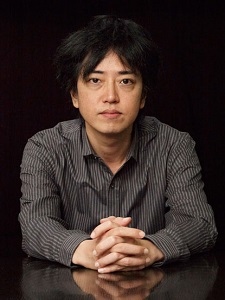De Japanse schrijver Fuminori Nakamura werd geboren op 2 september 1977 in Tōkai. Nakamura studeerde in 2000 af aan de faculteit voor openbaar bestuur van de universiteit van Fukushima. Tegenwoordig woont hij in Tokio. In Japan heeft Fuminori Nakamura al meer dan een dozijn romans gepubliceerd. Zijn werken zijn vertaald in verschillende talen en zijn verschenen in onder meer de Verenigde Staten, Engeland, China, Frankrijk en Spanje. In 2002 ontving hij de Shincho Young Award voor zijn debuutroman. In 2004 werd hij bekroond voor de Shako Noma Literatuurprijs, in het volgende jaar voor “Tsuchi no naka no kodomo” met de Akutagawa-prijs. Voor de roman “Suri” ontving hij in 2010 de Ōe-Kenzaburō-prijs. “Suri” werd door critici ook goed ontvangen in de Engelse vertaling met de titel “The Thief”; In 2015 verscheen de roman onder de titel “Der Dieb” als de eerste van Nakamura’s werken ook in het Duits. Als literaire invloeden noemt Nakamura onder andere Franz Kafka en Fjodor Dostojevski.
Uit: The Thief (Vertaald door Satoko Izumo en Stephen Coates)
“When I was a kid, I often messed this up.
In crowded shops, in other people’s houses, things I’d pick up furtively would slip from my fingers.
Strangers’ possessions were like foreign objects that didn’t fit comfortably in my hands. They would tremble faintly, asserting their independence, and before I knew it they’d come alive and fall to the ground. The point of contact, which was intrinsically morally wrong, seemed to be rejecting me. And in the distance there was always the tower. Just a silhouette floating in the mist like some ancient daydream. But I don’t make mistakes like that these days. And naturally I don’t see the tower either.
In front of me a man in his early sixties was walking towards the platform, in a black coat with a silver suitcase in his right hand. Of all the passengers here, I was sure he was the richest. His coat was Brunello Cucinelli, and so was his suit. His Berluti shoes, probably made to order, did not show even the slightest scuffmarks. His wealth was obvious to everyone around him. The silver watch peeping out from the cuff on his left wrist was a Rolex Datejust. Since he wasn’t used to taking the bullet train
by himself, he was having some trouble buying a ticket. He stooped forward, his thick fingers hovering over the vending machine uncertainly like revolting caterpillars. At that moment I saw his wallet in the left front pocket of his jacket.
Keeping my distance, I got on the escalator, got off at a leisurely pace. With a newspaper in my hand, I stood behind him as he waited for the train. My heart was beating a little fast. I knew the position of all the security cameras on this platform. Since I only had a platform ticket, I had to finish the job before he boarded the train. Blocking the view of the people to my right with my back, I folded the paper as I switched it to my left hand. Then I lowered it slowly to create a shield and slipped my right index and middle fingers into his coat pocket. The fluorescent light glinted faintly off the button on his cuff, sliding at the edge of my vision. I breathed in gently and held it, pinched the corner of the wallet and pulled it out. A quiver ran from my fingertips to my shoulder and a warm sensation gradually spread throughout my body. I felt like I was standing in a void, as though with the countless intersecting lines of vision of all those people, not one was directed at me. Maintaining the fragile contact between my fingers and the wallet, I sandwiched it in the folded newspaper. Then I transferred
the paper to my right hand and put it in the inside pocket of my own coat.”

Fuminori Nakamura (Tōkai, 2 september 1977)
